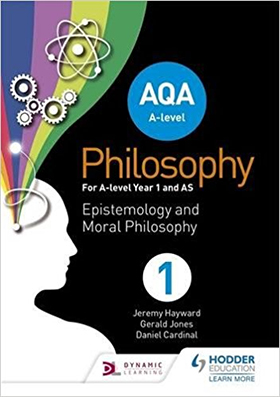








AS Course Outline
What does the course aim to do?
If you have ever wondered where it all started or what life is all about or whether we are all free, then you have already been doing philosophy. Philosophy is the activity of using rational argument and logical thinking to shine light on big questions. By studying philosophy, you will gain a deeper understanding of the world we live in and your own self. You will also form a greater appreciation of other subjects you will be studying, be they science subjects such as Physics or Biology or arts subjects such as English or History.

Which topics will you study?
At AS, you will look at two major topics: Epistemology and Moral Philosophy. Epistemology concerns the study of the nature and scope of knowledge and justified belief, and Moral Philosophy is the branch of philosophy that contemplates what is right and wrong; it explores the nature of morality itself and examines how people should live. This first year will provide an introduction to philosophy and will enable you to begin the task of considering such subjects in a provocative and enlightening way.
What skills will you develop when studying Philosophy?
Philosophy requires you to suspend your belief and disbelief while thinking. It asks you to avoid being too quick to jump to conclusions, especially the conclusions you want to be true. Thinking hard without quickly falling back on what you already think can be quite difficult at first; it can feel unsettling and personally challenging. But what is personally challenging also offers a chance to grow. Philosophy will also help you develop your ability to construct well-informed, balanced and structured written arguments as well as providing you with the necessary skills to examine information in a critical way as well as form judgments based on clear evaluation. In addition, as an essay-based subject, there will be plenty of opportunity for students to develop an ability to provide clear expositions of difficult ideas as well as rigorous and sustained commentary.
Who should study this course?
Philosophy appeals if you have skills in the Arts and/or the Sciences. Philosophy is a popular choice if you wish to impress when it comes to university applications. It also enables you to fine tune your reasoning so that your enhanced intellect can be applied to other careers. Law, politics, the civil service, journalism, education, medicine are some of the professions where your ability to turn abstract subjects into solid concepts will be highly regarded.
| PHILOSOPHY (AQA) AS Specification Overview | |
|
Section A: Epistemology
Section B: Moral Philosophy
|
|
What skills do I need for AS Philosophy?
Because philosophy is not a GCSE subject, and because it is not very much like anything else, everyone starts from scratch, so you do not need any particular GCSEs. However, clear expression is essential to Philosophy, so having done well in an essay subject, such as English, is important. An ability to be precise is also desirable along with clarity of thought, willingness to listen to others, a desire to engage in structured debate, concentration and focus.
What is the structure of the course?
This course will be taught for five 50 minute long lessons per week. Homework will be set on a regular basis. Students will receive both class and revision notes but the reading of textbooks along with classic philosophical texts as an accompaniment is highly recommended.
Introductory Reading
Simon Blackburn, Think, OUP, ISBN: 978-0192854254
Julian Baggini The Pig That Wants to be Eaten, Granta Books, ISBN: 978-1847081285

Core Textbook
AQA A-level Philosophy Year 1 and AS: Epistemology and Moral Philosophy (2017), Jeremy Hayward, Gerald Jones, Dan Cardinal
ISBN: 978-1510400252
Further Reading
Nigel Warburton, Philosophy: The Classics, Routledge, ISBN: 978-0415356299